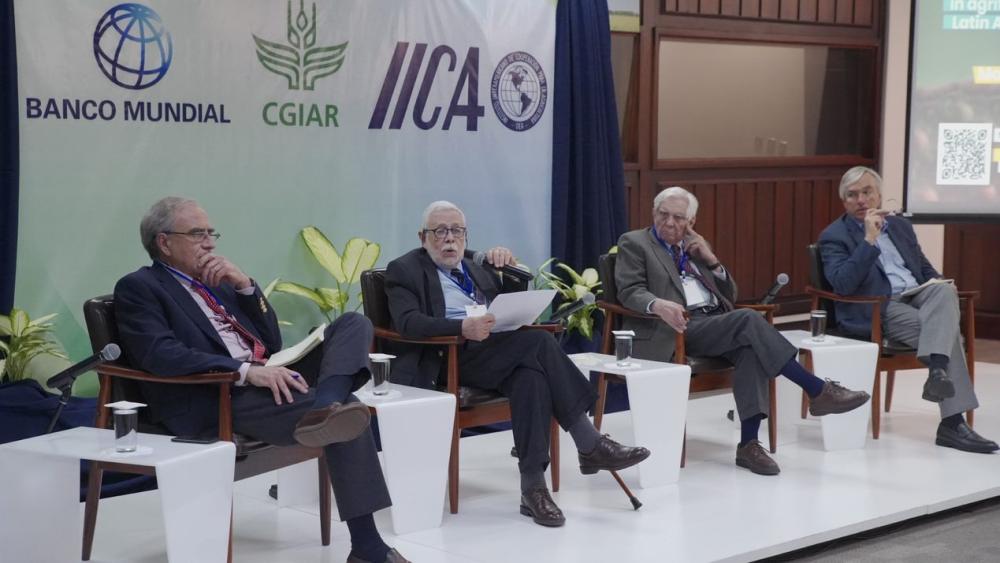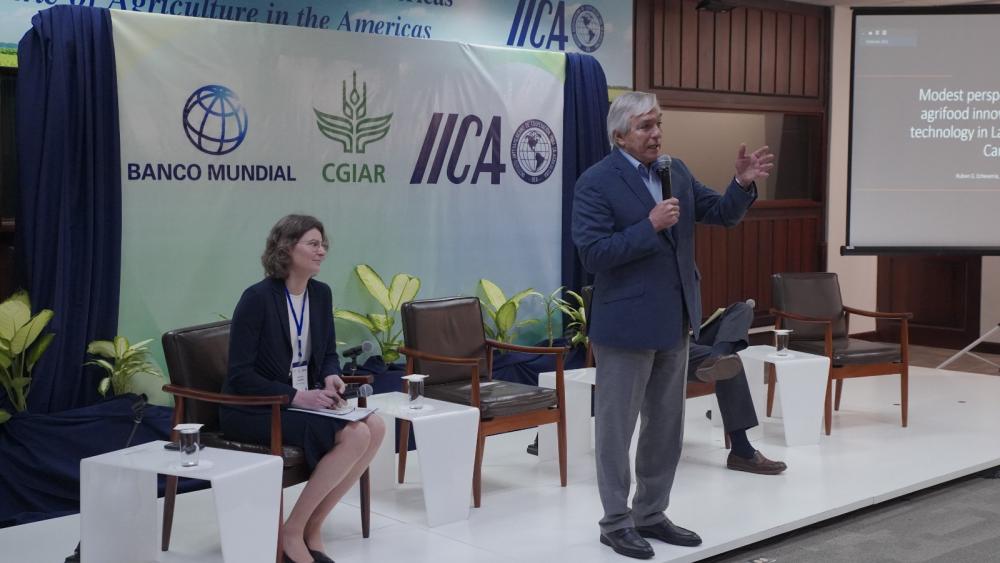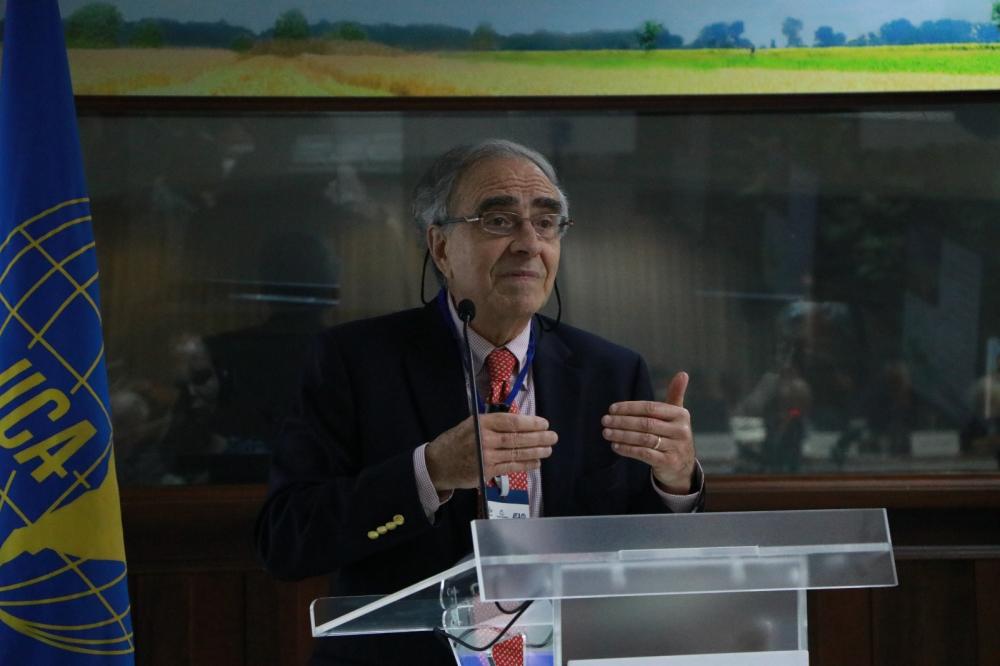At the Regional Dialogue on Science, Technology and Innovation in Agrifood Systems of Latin America and the Caribbean, participants discussed avenues for funding that countries in the region should explore to build a knowledge-intensive agriculture sector.

San Jose, 6 May 2023 (IICA) – International experts agreed that the Latin American and Caribbean region possesses the necessary conditions to increase investment in research aimed at transforming agrifood systems.
They highlighted the importance of advancing towards more sustainable agriculture, which will allow for strengthening the region’s role as a guarantor of global food and environmental security.
At the Regional Dialogue on Science, Technology and Innovation in Agrifood Systems of Latin America and the Caribbean, participants discussed various avenues for funding that countries in the region should explore to build a knowledge-intensive agriculture sector.
The high-level event was held over the course of two days at IICA Headquarters in San Jose, Costa Rica. More than 100 authorities and international experts took part in the event hosted by IICA, CGIAR and the World Bank.
Participating as speakers in the lectures on funding and opportunities for science and technology systems were Rubén Echeverría, Senior Agricultural Development Advisor at the Bill & Melinda Gates Foundation; Eugenio Díaz Bonilla, an economist and researcher with more than 40 years of international experience in agricultural and rural development issues; and Martín Piñeiro, Director General Emeritus of IICA and Agriculture Director at the Argentine Council for International Relations (CARI).
Among those who attended the event and enriched its discussions were authorities from the Gates Foundation, the French Agricultural Research Centre for International Development (CIRAD), FAO, CGIAR (a global research partnership for a food-secure future dedicated to transforming food, land, and water systems in a climate crisis), the World Bank and IICA.

Also in attendance were members of the scientific community, executive secretaries of cooperation mechanisms for science, technology and innovation in agrifood systems of the Americas, and authorities from national agricultural research and technology institutes of countries of the Americas and representatives of farmers’ organizations that play an active role in innovation systems.
“We have always complained that those of us who conduct research receive no funding for our budgets. Investment has not seen any growth over the past few years, even though society’s need has increased. However, I remain optimistic and believe that the requisite conditions exist to weave something very interesting in the region at this time”, said Echeverría.
The Uruguayan national, who has extensive experience in international organizations, pointed out that the agendas, priorities and funding sources of research systems have changed.
“At present, there are new demands for public investment in issues related to climate change, biodiversity conservation and restoration of degraded environments. However, there are fewer funding sources. Private investment seems to be outpacing public investment”, he explained.
Echeverría pointed out that, in Latin America and the Caribbean, Brazil is the country with the highest rate of investment in research.
“Overall, the region invests very little in agricultural research, despite agriculture’s significant contribution to the GDP, employment and countries’ food exports. Given the sector’s economic and social value, there is no reason why public research budgets should continue to decline”, he noted.
Echeverría highlighted the strength of the network of public research institutes, universities and private entities dedicated to science, explaining that “there can be no technological change without an institutional change”.
Aligning needs
Díaz Bonilla indicated that, in Latin America, the average investment in science, technology and innovation in agriculture is equivalent to 1.4% of the income generated by food production, compared to approximately 3 or 4% in developed countries.
The researcher discussed ways to align projects with international development funds, multilateral credit banks and philanthropic donors.
“We must undertake efforts to redirect funds based on our objectives. We must think about how we finance projects, but also consider other possibilities, such as the generation of green bonds or even other types of bonds, based on goals established”, he stated.
With respect to public budgets, Díaz Bonilla referred to the need to consider the types of funds that are channeled to each area.
“We must convince ministers of the Economy to prioritize funds for science in the agriculture sector when they approach multilateral credit organizations. We must review public spending and adequately redirect it”, he said.

Martín Piñeiro pointed out that the public sector continues to play a key role in defining the public policy framework for science and technology.
“Our perception is that public investment has grown weaker in Latin America, given that the budget of research institutes currently represents around 1% of the agricultural GDP”, he indicated.
Piñeiro stated that, at present, “we can no longer think in terms of agriculture, but rather in terms of agrifood systems. This introduces additional dimensions to the issue of production and productivity, such as environmental sustainability and the nutritional quality of food”.
“We are facing tremendous challenges, but we also have an incredible opportunity to reshape the science and technology system of agrifood systems in our region, adapting it to new scenarios to achieve significant development”, he concluded.
More information:
Institutional Communication Division.
comunicacion.institucional@iica.int











